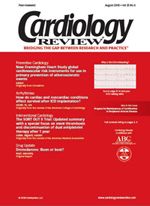Publication
Article
Cardiology Review® Online
New Framingham Heart Study global cardiovascular risk instruments: Helping physicians optimize their patients' cardiovascular care
Author(s):
While most patients are concerned about their risk for myocardial infarction, it is important to remember that the risk factors for death from all cardiovascular diseases, including stroke, peripheral arterial disease, and coronary artery disease, are similar.
While most patients are concerned about their risk for myocardial infarction (MI), it is important to remember that the risk factors for death from all cardiovascular diseases, including stroke, peripheral arterial disease, and coronary artery disease, are similar. Atherosclerotic disease is a systemic disease, and the discovery of abnormalities in any arterial bed suggests the presence of lipid deposits in all areas of the vasculature. At some level, most people are cognizant of their cardiovascular health; however, during a physician office visit, patients may be more receptive to learning their true cardiovascular risk and what they can do to improve it, providing clinicians with an opportune time for patient education. Unfortunately, laboratory tests are not always available during these visits and a brief letter or phone call days later may occur long after this potential “teaching moment” has passed.
The article by Dr Kannel,
which includes only clinical (not laboratory) variables, is not 100% sensitive and specific, but its primary advantage is its simplicity and ability to be used conveniently at an office visit. Without any biochemical data, an estimate of risk can be determined and discussed with patients and their families with reasonable precision. The risk of all cardiovascular diseases, not just MI, can be addressed, ensuring the patient’s office visit is productive. These cardiovascular risk algorithms can help clinicians take advantage of the critical time when a patient may be most receptive to assistance in smoking cessation, exercise, and weight loss, and appropriate referrals can be made immediately. Both the models with and without biochemical risk assessment evaluate risk for a variety of cardiovascular diseases, and patients need to know that risk of stroke and peripheral artery disease will also decrease if they take measures to decrease their chance of MI. Rates of heart failure, with and without preserved systolic function, are also likely to decrease.
Some may criticize these risk models for not including C-reactive protein levels and other “emerging” biomarkers in their assessment. While these concerns make sense in
research studies and in cases where the independence of any risk factor needs to be separated from any confounding variables, the goal of this model is practical use in day-to-day clinical practice; the determination of a variety of biomarkers may make this goal infeasible, complicated, costly, and more confusing for both patient and clinician. In addition, C-reactive protein testing, like the use of other biomarkers, can be fraught with limitations.2 The Framingham Risk Score algorithm is a practical model that can work to benefit the vast majority of people who would like to know their cardiovascular disease risk and learn how to minimize it.





